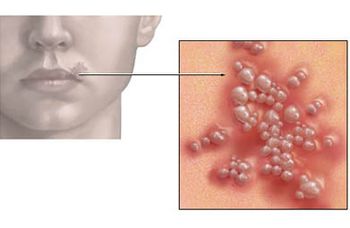Herpes
Description Herpes
Herpes – slight, painful, fluid-filled blisters. They usually appear in the lips.

Causes of herpes
The appearance of herpes, usually, caused by a virus Herpes simplex 1 type. Rarely is the cause of herpes virus herpes 2 type (2 type of herpes virus causing genital herpes).
In most cases, the herpes virus enters the body in childhood. The first episode of herpes simplex virus infection 1 type can lead to manifestations of the disease throughout the body. The virus is in the skin until, It is not activated, causing herpes.
Herpes virus infection can occur in the following cases:
- Contact with the fluid from blisters herpes infected person, or contact with ulcer, caused by genital herpes;
- Using utensils, razor, towels or other personal items with an active phase of human herpes;
- Consumption of food or beverage, which contacted a person with an active phase of herpes;
- Contact with saliva Human, infected with herpes simplex virus.
Risk factors for infection with herpes
Infection with the herpes virus is very common. Anyone is at risk of infection with herpes.
Factors, which can cause herpes include:
- Infection, fever, a cold or other illness;
- Stay in the sun;
- Physical or emotional stress;
- Taking certain medications;
- Weakened immune system;
- Menstruation;
- Physical injuries;
- Dental treatment or maxillofacial surgery.
Cold sores often appear for no apparent reason.
Herpes Symptoms
Initial infection with herpes simplex virus 1 type can cause flu-like symptoms. Repeat infections will cause herpes.
Herpes occurs most often on the lips, but can occur in the mouth or on other parts of the skin. Some of the symptoms of herpes include itching, pricking, burning or pain in the occurrence of herpes. Blisters, caused by herpes:
- Manifested in the form of small, disease, fluid-filled, with a red border bubbles;
- A few days later crust and a little hurt.
Diagnosis of herpes
The doctor will ask about your symptoms and medical history and examine the blisters. Usually, the physician can easily diagnose herpes, I am looking at him. In rare cases, the doctor can take away a piece of a blister to analyze. Also, test may be taken a blood sample.
Treatment of herpes
Herpes, usually, It passes within two weeks even without treatment. Nonetheless, certain procedures may reduce the symptoms, as well as to reduce pain. Herpes treatment includes:
- To reduce the pain, must be applied:
- Creams and ointments for the treatment of herpes and blisters;
- Applying ice to the blisters, to reduce pain;
- The use of mouthwash with lidocaine – for the treatment of oral herpes;
- Medicines, that can reduce the symptoms of herpes:
- Antiviral creams or ointments – They can also reduce the pain;
- Oral antiviral medications – appointed, to suppress the frequent manifestations of herpes. Examples of drugs:
- Acyclovir (Zoviraks);
- Valacyclovir (Valtrex);
- Famciclovir (Famvir).
- Avoid rubbing and scratching the blisters, it can slow healing and increase their likelihood bring other infection.
Preventing Herpes
To prevent infection with herpes virus 1 or 2 type:
- Be careful with people with active herpes. Avoid contact with their skin and not Kiss. Do not share food or personal items;
- Avoid oral sex with a person with active genital herpes;
- If you have an active herpes, Do not touch the contaminated sites. This will help prevent spreading the virus to other people and / or other body parts. If you touched the field of active herpes, you need to wash your hands.
The herpes virus after being hit in the body forever remain in it. There is no treatment for this infection. If you already have a herpes infection, to prevent future outbreaks of herpes or blisters:
- Do not spend a long time in the sun;
- Apply sunscreen on the lips and face, when you are in the sun;
- Fully relax, Try to minimize stress;
- If you have frequent outbreaks of herpes, Consult with your doctor about taking antiviral drugs.
